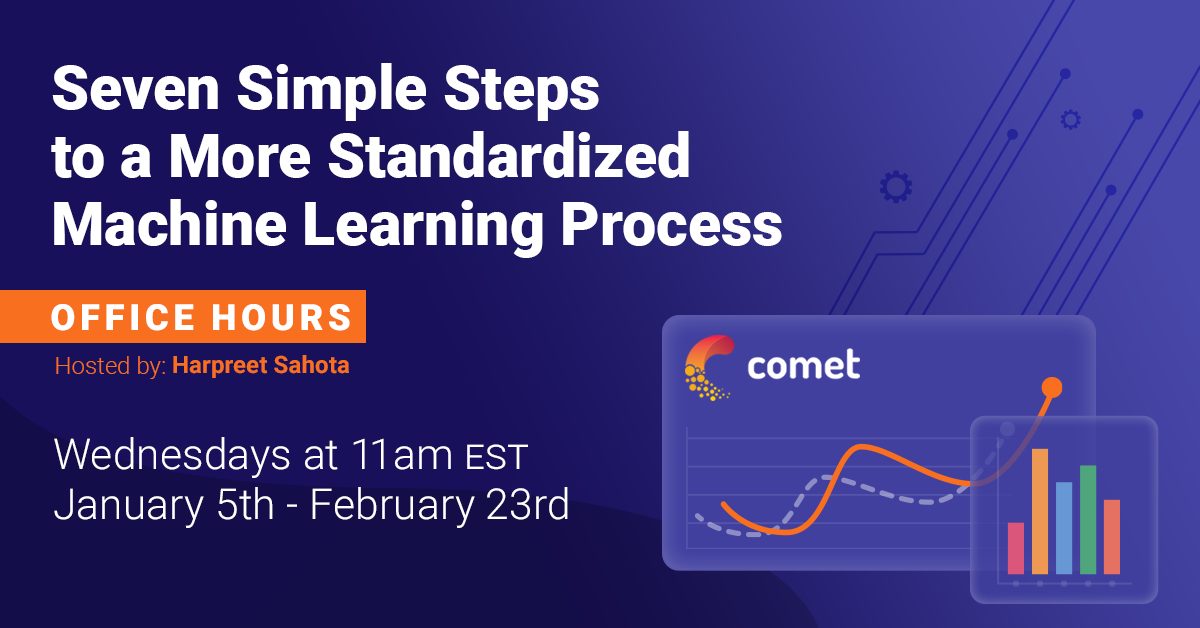Comet Office Hours: Recap for August 15, 2021
Welcome to another recap of the Comet ML Office Hours, powered by The Artists of Data Science! Let’s jump right in
This week, I found a couple of threads of discussion particularly compelling—as usual, straddling the boundary of technical conversations and philosophical musings.
First, a general discussion around burnout—something I know I’ve personally experienced, especially over the last couple of years. Beyond just the contents of the discussion, which were kind and specific, I was so heartened to hear the vulnerability from the group, the admittance of struggle, and the empathy for a complicated condition that can make human beings feel lost, cynical, and out of place, among many other difficult emotions.
And second, a more DS/ML-focused chat around the specific challenges of executing NLP projects in healthcare—a conversation I thought served as a good proxy for some of the challenges and hurdles in centering ML projects on domains that typically require a lot of domain expertise.
As a reminder, we’d love to see any and all of you at these hourlong sessions—so feel free to register for upcoming Office Hours sessions here!
As always, there’s a lot more in the full session (which you can find on Harpreet’s YouTube channel), so be sure to check it out, alongside all of Harpeet’s other excellent content.
Tips for avoiding burnout
As I mentioned in the intro, this discussion was heartening. One of the best ways of coping with the feelings and tendencies associated with burnout, in my experience, has been to share those struggles openly in a trusted group. Not feeling alone in this can be critical.
The range of practical responses from the group also rang quite true to me:
- Learn how to say no to things
- Self-care as means toward returning to work with more energy is a fraught concept
- Try functioning at or committing to 70% of what you believe your full capacity is
- Find ways to reconnect with things, people, and experiences that give you energy
- Speak with a therapist or other trained professional
Quite a few others as well, in addition to some really vulnerable and powerful self disclosures in the clip below.
The challenges of domain-specific projects
A question from Office Hours regular Bharat sparked what I thought was an interesting back and forth around the specific challenges in executing NLP projects in a domain like healthcare.
While the nuts and bolts of the conversation centered on working with transcribed patient note data, I felt like there were quite a few interesting takeaways that could be applied to many domain-dependent machine learning problems.
And healthcare—with its privacy regulations, traditionally messy data, and inconsistency in reporting requirements—served as a great proxy for unearthing some of these challenges.
Resources Mentioned
In addition to the wonderful back-and-forths throughout the session, there were a whole lot of interesting resources mentioned, both by Harpreet and many of the attendees. Here’s a quick list, in case you’d like to check out what is capturing the community’s attention.
- Full Stack Deep Learning (online course – ML for SE’s)
- Linking Your Thinking (online course)
- How to Take Smart Notes, Sönke Ahrens
- SyntheticMass Dataset – Synthetic patient records dataset
- CMS Synthetic Dataset – Centers for Medicaid & Medicare Services
- Time Off: A Practical Guide to Building Your Rest Ethic and Finding Success Without the Stress, John Fitch and Max Frenzl
Enjoy the Conversations Above? Join Us!
We run these virtual Office Hours every Sunday at 12pm ET (New York, NY). Completely free to attend and participate, and we’d love to see any and all of you there, help address any questions you might have, and just hang out and talk all things data science and machine learning!
Register for Comet Office Hours
One last thing…
We recently launched The Comet Newsletter, which offers a weekly inside look at all things data science and ML, featuring expert takes and perspective from our team. We have big things planned for both Office Hours and the newsletter, so be sure to subscribe if you haven’t already!
Subscribe to the Comet Newsletter
